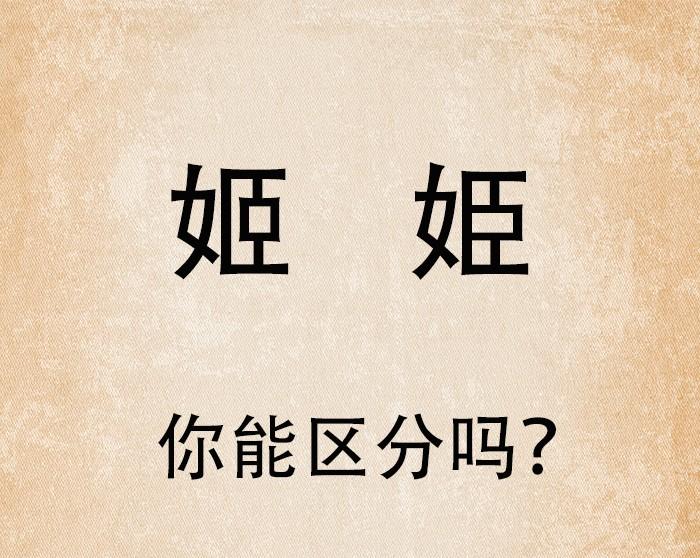Introduction: Friends, this article introduces a pair of highly similar Chinese characters "姬" and "姫", can you find out the difference between them at once? When I first saw "姬" and "姫", I always thought of them as a Chinese character. Please keep an eye on the following picture: the "mouth" in the two is different, can you see it clearly? In addition, they not only have different shapes, but also different pronunciations. This article uses these two words as an object to tell the historical and cultural story behind them.

What's the difference? Is there a difference between "mouth" in Chinese characters?
<h1 class="pgc-h-arrow-right" data-track="2" >jī: An ancient woman's name, referring to concubines. </h1>
Hime, left and right structure. "Female" means "woman, female"; "Tong" 䇫jī refers to the ancient wooden tool for combing hair buns (which can be understood as today's wooden combs). Therefore, "姬" is related to women, originally meaning the beauty of ancient women, and later extended to "concubine". Li Bai once had a verse: The wind and willow flowers are full of fragrance, and Wu Ji presses the wine to taste, of which "Wu Ji" refers to the beautiful woman of WuDi.
Ji, the beauty name of ancient women
<h1 class="pgc-h-arrow-right" data-track="2" > extended words: Yan Ji, Mai Ji, Ge Ji. </h1>
Since "姬" originally meant to refer to the beauty of women, when describing the industry engaged in by "beauty" in ancient times, the word "姬" was often carried. For example: Yan Ji (a beautiful and beautiful woman), Mai Ji (a woman engaged in dance in ancient times), and Ge Ji (a woman who was engaged in singing in ancient times). There is also a word: youji (mostly referring to a charming woman), and novels often describe such women as the beginning of misfortune. For example, Su Daji in "List of Fengshen Gods" is handsome but fierce.
There is a word called: Maihime
<h1 class="pgc-h-arrow-right" data-track="2" > Chinese character "姬jī" Extended Story: Yu Ji - The heroine of "Overlord Farewell"</h1>
If you say that Yu Ji you have not heard of, then "Overlord Farewell" should always remember it; if you don't know it, the three words "Yu Meiren" have always been slightly heard. Yes, she is the beauty "Yu Ji". Yu Ji was the beauty of Xiang Yu, the king of Chu during the Chu and Han dynasties, and it is said that she had the appearance of falling into the country and the city, and she could sing and dance, and she was known as a "Yu Beauty". Yu Ji conquered Xiang Yu with her own talent, but she had no choice but to live a long life since the ancient red face, and both Yu Ji and Xiang Yu died on the side of the Chu River.
Opera: Overlord Bieji
<h1 class="pgc-h-arrow-right" data-track="2" > Chinese character "姬jī" Extended Story: Zhao Ji - Qin Shi Huang's biological mother. </h1>
If "Zhao Ji" you have not heard of, but his son should be known to everyone, that is, Qin Shi Huang (嬴政). Zhao Ji was the queen consort of King Xiang of Qinzhuang and the first "empress dowager" in Chinese history. Zhao Ji (赵姓, 姬 was her identity and title at the time) had a bad fate, originally a thousand gold for the rich man of the Zhao kingdom, and became his wife and concubine after meeting Lü Buwei, who finally presented Zhao Ji to King Xiang of Qinzhuang. This story of twists and turns has left posterity with a topic that is still being debated: Is Qin Shi Huang the son of Lü Buwei?
Zhao Ji, the biological mother of Qin Shi Huang
<h1 class="pgc-h-arrow-right" data-track="2" >jī, one of the eight oldest surnames. </h1>
The surname Ji, as one of the eight surnames in ancient times, makes people extremely respected when they look at it. Which of the eight surnames in ancient times? (姬, 江, 姒, 嬴, 妘, 妫, 姚, 姞). You will find that there is a "female" department in these eight surnames, why is this? Ancient surnames originated in matrilineal clan societies, and the Chinese characters for "female" have the same meaning as "mother". Therefore, "mother" is used as a symbol.
In matriarchal society, women dominate, just look at the surname
<h1 class="pgc-h-arrow-right" data-track="2" > 姫zhěn: Caution. </h1>
Since "姬 jī" and "姫zhěn" are so similar in appearance, they are mistakenly believed to have the same meaning. Compared with the two Chinese characters, "姫 zhěn" is a completely strange character, and it is not much use in real life. The Kangxi Dictionary explains: "姫zhěn", caution also, contains the meaning of caution. In addition, there is also the word "hime" in Japanese, which means a girl, the daughter of a rich family, etc. Since it is rarely used and helps us very little, there is no need to over-interpret it.
"姫zhěn", not much used. It has become a strange word
Summary: Through the above explanation, in fact, the purpose is to distinguish these two Chinese characters. Second, be able to gain a deeper understanding of the cultural story behind Chinese characters. I hope everyone has gained something, I am Liaocheng Wanggang, see you in the next article.
If you are interested in Chinese characters, welcome to buy the "Chinese Characters Decryption" column Oh [smile]